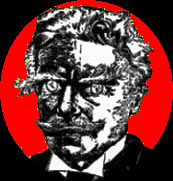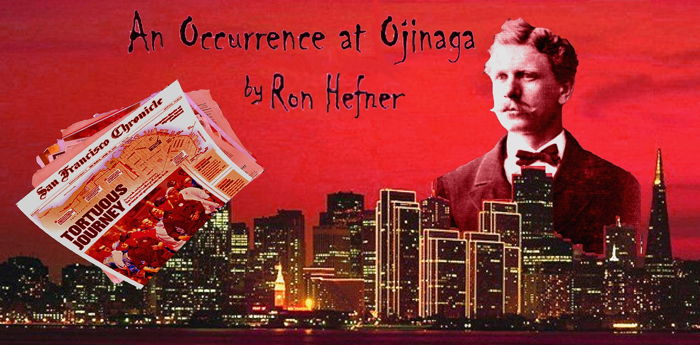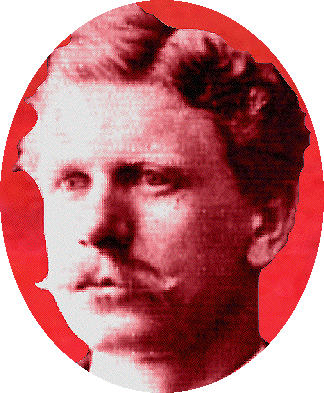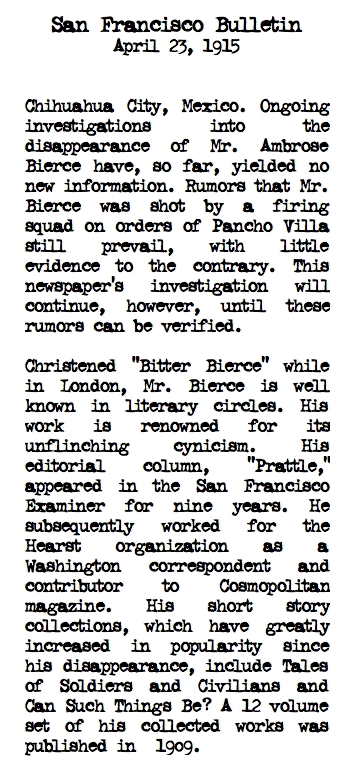 |
the AMBROSE BIERCE site |

Future, n. That period of time in which our affairs prosper, our friends are true, and our happiness is assured. Ambrose Bierce, Devil's Dictionary
Mr. William Randolph Hearst Dear Mr. Hearst: I am a freelance journalist and am in the process of writing a book on the revolution. I am acquainted with several of the correspondents here, including Mssrs. Frederick Palmer, Gregory Mason, and George Clements. Aside from their coverage of the fighting, there is considerable interest among these men as to the whereabouts of your former employee, Mr. Ambrose Bierce, the circumstances of whose disappearance here remain a mystery. I realize that what you are about to read will seem utterly fantastic and absurd. I assure you, however, that the information enclosed herein was transcribed with the utmost accuracy. Your "nose for news," Mr. Hearst, is widely renowned. Therefore, I hope that you will assess the content of this report in light of its newsworthiness. On the twenty sixth of last month I departed by rail from Mexico City. My destination was the town of Ojinaga, where Pancho Villa and his troops were planning an all-out assault and occupation. The last leg of my journey was completed on horseback, as the railway ends sixty miles south of Ojinaga. I enlisted the services of a guide, Juan Carlos Carrera, who accompanied me on the difficult ride across the plains. Mr. Carrera had a fair grasp of the English language and was most helpful in providing me with information as to the conditions in the area for the natives, as well as information on the various military movements. In the course of our conversations, I asked Mr. Carrera if he had any knowledge of Mr. Bierce's whereabouts. He told me of a man who lived in the desert outside Ojinaga, an old man who had a reputation as a conjurer of spirits. The man, he said, claimed to have met Mr. Bierce. I urged him to introduce me to the man. Mr. Cararra was reluctant at first, but finally agreed when I offered to add a bonus to his fee. We found the man, who was known only as don Fernando, in a tiny adobe hut approximately two miles west of the town. He sat cross- legged on the dirt floor of the hut, an ancient, wrinkled man with long white hair tied in a pigtail. I instructed Mr. Carrera to query him about Mr. Bierce. The man stood up, stared at me, and spoke for several minutes. He seemed quite serious and concerned. Mr. Carrera responded to him at length. Finally, the man seemed to reach some kind of agreement with Mr. Carrera. He went to a drawer in an old desk and took out a packet of papers. Handing the packet to Mr. Carrera, he nodded silently and waited. Mr. Carrera explained that I was to read the papers and, if I was interested in them, don Fernando would sell them to me. His price was rather exorbitant. Don Fernando then walked out of the hut to sit outside and meditate while I reached a decision. Mr. Carrera explained that don Fernando had indeed met Mr. Bierce, who had been riding a donkey in the desert a week before. They had conversed with some difficulty; apparently, Mr. Bierce had only a rudimentary knowledge of Spanish. Don Fernando had invited Mr. Bierce to his hut for a drink of mescal. He had advised Mr. Bierce to leave the area because of the military activity. Villa was highly suspicious of American journalists and it was rumored that he had executed one of them already. Mr. Bierce had laughed and seemed unconcerned about the danger. But that was not the last time don Fernando would encounter Mr. Bierce, as the enclosed papers indicate. Mr. Bierce then returned to Ojinaga. Several days later, don Fernando claims that a spirit voice told him to place several sheets of paper on the floor. He did so, and handwriting began to appear on the papers. Mr. Bierce, said don Fernando, was dead and was using the papers to communicate from spirit world. Mr. Carrera was shaking his head and smiling apologetically as he related this information to me. Obviously, he said, don Fernando was a deluded old man and had no useful information concerning Mr. Bierce. My curiosity was piqued, however. I looked at the papers. They were written in English. The handwriting was quite legible and is definitely in the style of Mr. Bierce. Their content is, as I'm sure you will agree, a fabrication of the wildest sort. No doubt, this entire matter is an elaborate hoax engineered by Mr. Bierce, who most likely remains somewhere in this area. It is also clear that don Fernando is part of the hoax. I now submit the papers to you. As I mentioned previously, Mr. Hearst, you have a fine sense of news. If you deem this material publishable, please contact me to discuss payment for a story. Sincerely, 
Pancho Villa has ordered my execution. He has heard rumors that I was switching my allegiance to the Constitutionalists, which is, of course, patently absurd. I have no allegiance to anyone but myself. I did not come here for political reasons; I came merely to observe. I stand before a stone wall, blindfolded. Six riflemen are stationed before me, their guns aimed and ready to fire. My thoughts are of my family, three of whom have already escaped this dreadful life: Mollie, my departed ex-wife--how we suffered each other!--the only woman I ever loved; my departed sons, Day and Leigh, both of them, regrettably, too much like their father. Helen, my daughter, whom I visited shortly before I came here, I believe will miss me. She has always patronized me; I know that she loves me in spite of our difficulties. I think of the letter I wrote Lora, my nephew's wife: "If you should hear of my being stood up against a Mexican stone wall and being shot to rags, please know that I think it is a pretty good way to depart this life. It beats old age, disease, or falling down the cellar stairs. To be a Gringo in Mexico--ah, that is euthanasia!" The irony of this, I now embrace. A command is uttered. I hear the rifles being cocked. The wind blows dust into my nose and ears. My hands are tied behind me. There is no point in trying to run; my time has come. I stoically prepare to face that joker, Death, whom I have always suspected would turn out to be an even greater joker than his counterpart, Life. Suddenly, there is a disturbance to my left, the sound of horse's galloping hooves. Men are shouting, shuffling. There is gunfire; I hear bodies drop. In the commotion, I wriggle out of the ropes that bind my hands and rip off my blindfold. A dozen men on horseback have ridden into the compound, spraying bullets in all directions. Villa's enemies, or perhaps bandits or vigilantes. I disappear around the stone wall and break into a run. I hear my name shouted; bullets zing past my head. I run with all my strength, unthinking, the instinct for survival pushing me onward, out and away into that vast dreary desert. I run, seemingly, for miles, my legs screaming in pain, my lungs bursting. At length, I stop, exhausted. The horizon behind me is barren. No one has followed me. I am lying on the ground. The face of a man appears over me, an old, wrinkled man with a long white pigtail. It is don Fernando, the curious sage whom I met just a few days ago. I attempt to communicate to him in my broken Spanish. He seems to understand. He helps me up and we go to his nearby hut. Inside, he gives me water. He talks to me with concern. From what I glean, he wants to help me. I cannot stay here, Villa's men will be searching for me. I ask him if he has a horse or a donkey. He shakes his head. "Partirias!" he says--You will depart. Yes, I respond. But how? To where? He straps a backpack onto my shoulders, then takes both my hands and begins to chant in Spanish, his eyes rolled upward to the ceiling. I feel a warmth coursing through my veins, I feel dizzy, sleepy. Suddenly, I have the sensation that my body is gone; I am light as air. I seem to be flying through a void of infinite space. I fly for an indeterminate amount of time, then I begin to slow down, as a train does when approaching a station. I feel the weight of my body returning; images begin to form before my eyes. There is much noise, the sounds of machines and people walking about. 
I have somehow been transported through space. I am on a street corner in a great city. But this city is like none I have ever seen! The automobiles--there are hundreds of them--are strange--low to the ground--and colorful--reds, blues, greens of every conceivable shade, and their speed is incredible! They are flying by at an impossible rate, yet their motors are humming so quietly! The buildings of the city are vast structures which reach to the sky; many must be fifty stories or more. Some of them seem to be constructed entirely of glass! I look around at the people on the street. They are dressed in brightly-colored clothing. Some of the men wear suits of a strange, unnatural-looking fabric; others wear tight denim pants and what appear to be knitted undershirts! The woman are attired even more strangely--some are wearing pants and tight-fitting blouses; others wear skirts of the briefest length. I am regaled by the sight of female knees everywhere! I look down at myself. I am wearing the same clothing in which I was to be executed: baggy overalls of drab gray material, my leather boots. I unstrap the backpack and look inside. There are several changes of clothes and a leather pouch. The pouch contains money. The currency is strange--smallish and printed on stiff paper. It says United States of America. I count the bills--fifteen hundred dollars, the same amount which I brought with me into Mexico. Don Fernando's magic has been quite thorough and accommodating!Before me is a sidewalk stand which sells newspapers and periodicals. There, I pick up a paper and read the front page. The San Francisco Examiner. I realize with a shock that don Fernando has not sent me to some nether world. He has sent me to San Francisco--my San Francisco! But that is not all: The newspaper's date reads July 7, 2008! At the age of seventy one, I have escaped death--a death for which I had been at least reasonably prepared--only to find myself in a life for which I am totally unprepared! I purchase the newspaper -- it costs an unbelievable 50 cents! -- and sit on a bench along the curb. There is a sign: BUS STOP. I want to read the newspaper and learn about this world I am in, but I am too absorbed by my surroundings. Seated next to me is a man wearing an earring! On the sidewalk nearby, a young lady has stepped on a piece of chewing-gum. As she attempts to scrape it from the bottom of her shoe, she unleashes a stream of expletives that would make Twain blush! 
A huge, grimy conveyance, spewing the most noxious black fumes, pulls up to the curb. The man, the young lady, and several other people board the vehicle. The driver peers at me with indifference. On the door of the vehicle is a sign proclaiming "Exact change: $1.00." Apparently, the America of 2008 is quite a prosperous one! I open the newspaper and look at the masthead. The publisher is Hearst Newspapers! The newspaper's address is on Mission Street. I wonder if Hearst's grandson is running the company. The Hearst empire must have grown to enormous proportions after all these years. I wonder if Cosmopolitan is still being published. I must get my bearings. I walk to end of the block and look at the street signs. I am in Union square, at the corner of Post and Powell. There, a comforting sight greets me: a cable car, crowded with passengers, makes its way north on the Powell Street tracks. And there, on the southwest corner, is the Westin St. Francis, built by that scoundrel, Charles Crocker. He and his millionaire friends used to luxuriate there in the Turkish baths. That elegant hostelry is barely recognizable; a huge addition has been built on to it -- a veritable tower, thirty or more stories high. An elevator runs up its exterior wall. It is made of glass! I shake my head in wonder, imagining the view that it must afford! I walk three blocks south on Powell, to Market. There is the cable-car terminus, swarming with people. The red cars have barely changed at all. I wonder why this mode of transportation--now more than a century old--still exists with the availability of modern automobiles and buses. The sidewalk is crowded. A teenaged boy with a shaved head attempts to panhandle money from me. I ignore him. A disgraceful, slovenly man, babbling wild-eyed about Armageddon, thrusts a pamphlet into my hands. I look at the pamphlet with disgust. "The end is near," it proclaims. "Get right with God!" Apparently, another thing that has not changed is man's penchant for religious twaddle! I walk toward Mission Street. I must see the Examiner office. What if Hearst III is there? Could I speak to him, and, if so, what should I say? He would, of course, think me a madman if I tell him I am Ambrose Bierce, the wickedest man in San Francisco, who worked for his grandfather. Bitter Bierce, whose column in the old Examiner was most widely and fearfully read! Not one of the countless hypocrites and rogues in that city was immune to my journalistic barbs! As I walk, my attention is diverted by a monstrous building to my left. The edifice literally touches the sky! It is constructed of some kind of dark red stone. I turn on Kearney Street and hurry toward the building, craning my neck as I perceive its impossible height! The enormous structure stands in a square block bordered by California, Pine, Montgomery, and Kearny streets. In front, a gigantic, ugly lump of black stone is on display. I query a passer-by. This is the Bank of America building, he says. He refers to it as a "skyscraper." According to him, the massive black lump, which apparently passes for some kind of sculpture, was commissioned for an unbelievable sum of money and has been christened "The Banker's Heart" by the general public. I make two mental notes: One--those blackguards, the bankers, have obviously maintained their position of absolute dominance; two--the people are as resentful of them as ever. 
I walk down Montgomery Street, my old street, which has been transformed beyond any recognition. I stare at a building ahead. The Wells Fargo Bank History museum. I shake my head, incredulous. The immortality of the great god mammon! To my left, a giant, hideous triangular-shaped building sweeps upward. I ask a woman about it. It is the Transamerica Pyramid, she explains. An insurance building. I nod grimly. Insurance companies, it seems, have also grown to malignant proportions. To my right, I see the pitiful remnant of the Mills Building, its white marble and brick facade now dwarfed by another soaring tower, attached to it like an afterthought. I walk slowly back toward Market, to 10 Montgomery, the address of the Examiner. It is gone. In its place stands another faceless glass and stone edifice. I find another bench, where I sit and peruse the Examiner. As I read, I begin to understand the meaning of this, my reprieve! This world, beneath the veneer of its spectacular architecture and modern miracles, has changed not a whit! Political scandal abounds: The president, a man named Bush, and his cabinet members, are accused of all manner of evildoing. War rages all over the planet. Murders, financial scandals, all of the familiar vice and corruption which I so astutely and tirelessly attacked in my columns, continue unabated. Here is an article about how industrial wastes have fouled the environment beyond repair! I cannot help but feel a grim sense of satisfaction as I read. I, Ambrose Bierce, was correct: Man, that most selfish and ignorant of all creatures, is on an unerring path to self-destruction. Here, in this newspaper, more than 100 years after my dire predictions, is the proof! I turn to the editorial page. There is much criticism, largely humorless. I am saddened to realize that virtually all of the writers of these editorials are allied with one political cause or another. Liberals, conservatives--pish posh! Where is the purveyor of truth, the writer who is unafraid to spell out the bare facts: Man is base, deplorable, execrable! And, where is the humor? Does no one see the irony of man's swollen ego and the absurdity of his so-called "accomplishments?" I am overwhelmed by the gravity of my mission: I have been sent here by some all-knowing deity to continue my crusade against man's unending foibles! I, Bierce, have been given this miraculous opportunity because it is I who can shake this world out of its narcoleptic submission! I remember too well my creed as associate editor of the Argonaut: "I am for observing the ancient, primitive distinction between right and wrong. The virtues of Socrates, the wisdom of Aristotle, the example of Marcus Aurelius, the selflessness of Jesus Christ, engage my admiration and rebuke my life... I lift reverent eyes to the shining summits of truth... I strain my senses to catch the law that they deliver..." The words resound through my soul!
I will go to the Examiner. I will resurrect my column, "Prattle"! As I hurry toward Mission Street, my head swarms with ideas. Think of the addendums to my Devil's Dictionary afforded by this modern world! Bus. n. A filthy, overcrowded, and inordinately expensive method of getting somewhere you don't want to go! Art. n. The excreta of an unskilled artist, available at exorbitant cost for the edification of tasteless bankers! Skyscraper. n. A tall, phallic structure, erected as a monument to man's single greatest achievement: robbery! Progress. n. The evidence used to measure the relative position in time of man's steady advance toward annihilation!The possibilities are infinite! The Examiner office is an enormous building, many stories high. I walk resolutely to a front desk, where a woman looks at me dubiously. I am aware that my appearance is unusual. Beyond the woman, behind great sheets of glass, people sit at desks, typing on strange-looking machines. On the desks are square things with glass windows in which words magically appear. "May I help you?" the woman asks. I give her a most charming smile. Little does this unsuspecting woman realize the import of this encounter. Bierce is back! But, suddenly, my smile evaporates. I am overcome with delirium. The image of the woman swims before my eyes. Can this really be happening? It all seems too unreal... Perhaps I am dreaming. I open my mouth to speak but cannot find words... A man barks a command in Spanish. There is a loud report of six rifles being fired simultaneously. All is dark, final. My body lays in the dust before the stone wall in Ojinaga. I am shot to rags. __________________________ Ron Hefner is an English professor at Florida Gulf Coast University, Fort Myers.
Art by K.A. Silva. |

